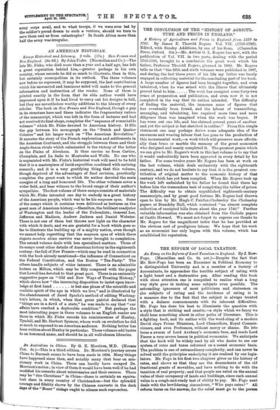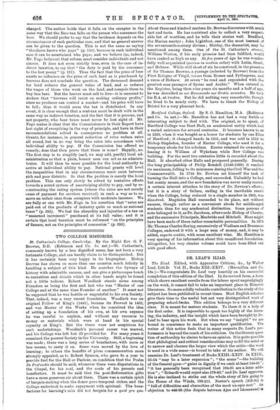THE REFORM OF LOCAL TAXATION.
An Essay on the Reform of Local Taxation in England. By I. Row- Fogo. (Macmillan and Co. 6s. net.)—Despite the fact that Mr. Row-Fogo has been an Examiner in Political Economy to a distinguished University and is a member of a Society of Accountants, he approaches the terrible subject of rating with a light heart and a destructive pen. After reading this book with close attention one is compelled to realise what a long way style goes in making some subjects even possible. The astounding ignorance of most politicians and statesmen on the subjects of rating and the incidence of rating is in a measure due to the fact that the subject is always treated with a dulness commensurate with its inherent difficulties. Mr. Fogo has done his best to illuminate the question with a style that is striking and caustic,—a style which we fancy we shall hear something about in other paths of literature. This is a fighting book, and its author with the word-sling of a modern David slays Prime Ministers, Lord Chancellors, Royal Commis- sioners, and even Professors, without mercy or shame. He lets loose a swarm of Lord Avebury's economic bees, and reads Lord Farrer a very severe lesson in political economics. We anticipate that the book will be widely read by all who desire to see our system of rates and taxes reformed on a sound economic basis. The problem is one of extraordinary complexity, and can never be solved until the principles underlying it are realised by our legis- lators. Mr. Fogo in his first two chapters gives us the history of rates, and shows us that they are the descendants of the old fractional grants of movables, and have nothing to do with the taxation of real property; and that people are rated on the annual value of their occupancy of lands and buildings, since such annual value is a rough-and-ready test of ability to pay. Mr. Fogo next deals with the bewildering conundrum, "Who pays rates ? " All reform turns on the answer, for the relief must go to the person charged. The author holds that it falls, on the occupier in the same way that the Beer-tax falls on the person who consumes the beer. We should prefer to say that the incidence depends on the circumstances of each particular case, and that no general answer can be given to the question. This is not the same as saying "Goodness knows who pays" (p. 110), because in each individual case it can be ascertained who pays; and we believe (as, indeed, Mr. Fogo believes) that reform must consider individuals and not classes. It does not seem strictly true, even in the case of in- direct taxation, to say that " the duty is paid by the consumer to the last penny" (p. 131). Thus the fact that the price of beer exerts no influence on the price of such land as is purchased by brewers does not conclude the question. The decreased demand for land reduces the general value of land, and so reduces the wages of those who work on the land, and compels them to buy less beer. But the brewer must sell to live—it is unsound to declare that "brewers will insist on making ordinary profits," since no producer can control a market—and his price will have to fall ; thus it would seem the tax is distributed. In any event, it is clear enough that a rent-tax must be dealt with in the same way as indirect taxation, and the fact that it is persons, and not property, who bear taxes must never be lost sight of. Mr. Fogo makes it clear that the Commissioners in their Report have lost sight of everything in the way of principle, and have in their recommendations solved in consequence no problem at all. Giants, for instance, in general reduction of rates reduce rates all round, but in no way bring the rates into accordance with individual ability to pay. If the Commission has offered no remedy, does that then prove that there is none? Happily, no. The first step is to simplify (and, we may add, purify) local ad- ministration so that a plain, honest man can act as an adminis- trator. It will then be more possible for the local authority to arrive at individual ability to pay. National grants will level the inequalities that in any circumstances must exist between rich and poor districts. So that the problem is merely the local problem. This can only slowly be solved by tentative efforts towards a sound system of ascertaining ability to pay, and by re- constructing the rating system (where the rates are not merely cases of payment for services received) in such a way as to re- move an unfair onus from occupiers with moderate incomes. We are fully at one with Mr. Fogo in his assertion that "rates are paid out of the products of industry quite as much as national taxes" (p. 285). We feel the absurdity and injustice of a tax on "unearned increment" purchased at its full value; and it is certain that local taxation must be reformed "on the principles of finance, not on the principles of concession " (p. 393).



























































 Previous page
Previous page